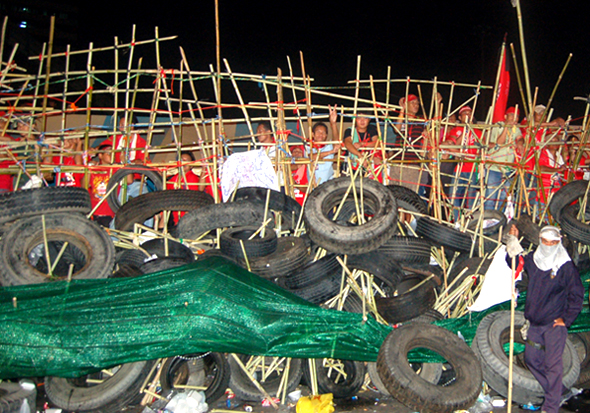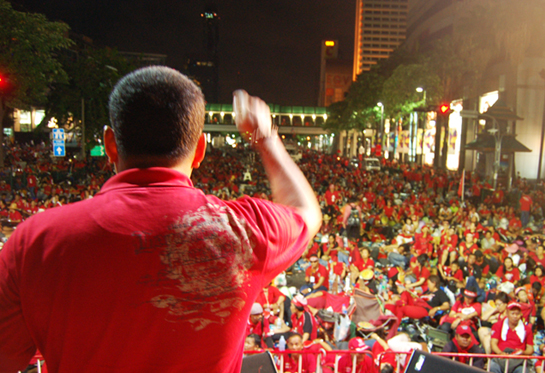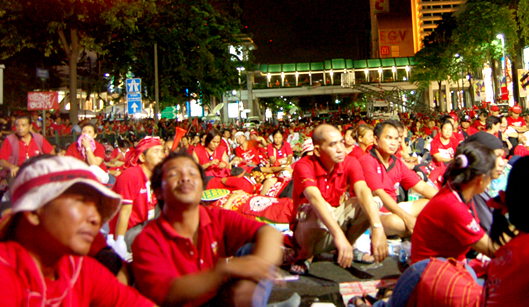
For weeks in Thailand armed troops have encircled thousands of anti-government protesters who in turn have been busy fashioning makeshift fortifications with tires and cement blocks. The equally entrenched opposing forces are gearing up for what many see as an inevitable confrontation. At least 25 people were killed and over 800 injured in violent clashes between protesters and the military on April 10, the worst political violence here since troops attempted to crush a pro-democracy uprising in 1992.
Prime Minister Abhisit Vejjajiva said Tuesday his government had no choice but to clear protesters illegally occupying the heart of the capital’s upmarket shopping district, home to hundreds of homes and offices as well as luxury malls and high-end hotels. "We have to preserve the rule of law for our children in the future," Abhisit said, suggesting it was a matter of when, not if, a crackdown would take place.
But on Wednesday, with renewed clashes appearing inevitable, both sides put out feelers suggesting there was still some room for negotiations, which would largely center around agreeing on a timeline for holding new elections.
Thailand has been beset by political turmoil since pro-establishment forces coalesced under the banner of the People’s Alliance for Democracy (PAD) (known as the "yellow shirts") in 2005, launching mass protests that paved the way for a military coup to oust the elected government led by then Prime Minister Thaksin Shinawatra on September 19, 2006. There have been many twists and turns since that fateful day and the country has hitherto failed to regain its democratic footing.
A "Genuine Class Struggle"
Bangkok, a symbol of the country’s prosperity and modernity, is no stranger to the din of deadly armed clashes between the kingdom’s military and civilians. But for many, the current battle is markedly different and perhaps more profound than previous pro-democracy uprisings of the past 40 years.
Thailand has had a shaky relationship with democracy ever since absolute rule of the monarchy was overthrown in 1932, with at least 18 coups or attempted power grabs since then. Throughout that time, the military and other institutions influenced by the country’s privileged elite have often played a key, but decidedly unconstitutional role in the running of governments.

Stirring the pot today are the increasingly defiant and provocative anti-government protesters known as the "red shirts", who say their votes have been usurped by a meddling elite and the military. They are demanding new elections and "true" democracy. What started off as a movement of supporters of the ousted prime minister Thaksin has since mushroomed into what many accept as a genuine grassroots pro-democracy movement. Thousands of people have been joining anti-government rallies in cities across the northeast as well as in Bangkok.
In past pro-democracy uprisings in Thailand, such as in 1973 and 1992, the protests were largely made up of middle class left-wingers and students. Now however, those lying out each night on rattan mats under tents in the heart of Bangkok’s shopping and business district hail predominantly from the rural and urban poor, traditionally seen as a politically passive majority.
"This is in essence a suffragist movement that struggles to accomplish the civil and political rights that unelected institutions in Thailand have long made a big deal of guaranteeing on paper but have otherwise systematically subverted. It’s a movement of people who no longer want to be second class citizens, who want the law to apply equally to them as to their more privileged countrymen," says Federico Ferrara, political scientist and author of the book Thailand Unhinged. "It’s a movement of people who want elections to have consequences. It’s a movement of people who want the governments they elect to not have to constantly bump into ‘reserve domains’ and be removed through coups (military or judicial) whenever such domains are encroached."
Noticeable in the red shirt rhetoric is their re-appropriation of the word "prai", which can be roughly translated as "commoner", or "bonded serfs", in the pre-modern Thai social structure. The word is ubiquitous at the rally, plastered across T-shirts, painted on faces and used in speeches, reflecting a new found pride in their status as "commoners". It is marked in its use in direct contrast to the term "amart", or "aristocracy", whom the red shirts label as their oppressors and accuse of forever meddling in politics.
"Prai simply explains everything. We are prai," says Weng Tojirakarn, one of the key leaders of the red shirts, or United Front for Democracy against Dictatorship (UDD) as they are formally known.
"Nobody wants to be treated like a dog. Everybody must be treated equally as a human being. For the prai, they only fight to let society accept that they are human. This society dehumanizes people, so that is why the majority of the people now understand what the red shirts are fighting for, it is just only the elite class that is fighting against this."
Grievances
Despite sweltering heat and the threat of violence, thousands have been camped out on the streets of Bangkok for nearly six weeks. The sounds of anti-government speeches reverberate between the high-rise buildings around the protest site and emanate from taxicabs and transistor radios across the sprawling capital. Red shirt ‘guards’ at makeshift roadblocks stop and check cars, taking the law into their own hands while protest leaders pump up the crowd with talk of an imminent "final showdown", all adding to the increasing tension.
Throughout, the prime minister has remained steadfast in his dismissal of the legitimacy of their claims and has refused to step down. Over recent days, thousands of armed troops have been sent to guard the city’s main financial district, just meters away from the edge of the red shirts’ conquered area.

The protesters are angry after seeing the last three elected governments ousted by coups or collapsed by dubious court decisions. They say the Democrat-led government was unlawfully installed thanks to backroom deals brokered by the military after the previous ruling party, aligned with Thaksin, was dissolved for electoral fraud.
"The September 19 coup, was not only meant to oust Thaksin, but to create the strongest bureaucratic [fascist] system that Thailand has ever seen," says Weng. "The coup destroyed everything in Thailand, everything. Every system, every rule, every law, every organisation has been distorted for the benefits of the bureaucrats; this destroyed the real rule of law. This is a class struggle, a struggle of the poor, the exploited."
In response, pro-establishment rhetoric propaganda has been flying since the April 10 clashes. Leaders of the yellow shirt PAD movement have threatened to take to the streets "to defend the monarchy" and the rule of law if the government does not end the red shirt protests in the next few days, saying the country could be plunged into a civil war if the state doesn’t act immediately and decisively.
The government and the military, as well as the yellow shirts, with the aid of the mass media, have also been fomenting paranoia and the conception that the red shirts, aligned with "terrorists", represent a genuine and immediate threat to the nation and the future of the monarchy. Critics say this has been a conscious and determined effort by the government and its backers to pave the way for a decisive crackdown on the red shirts.
An ‘Entrenched Elite’ and a ‘Frightened Middle Class’
On face value, the demands of the red shirts – elections, the rule of law, ‘genuine’ democracy and the end of interference in politics by extra-constitutional forces – seem justified to many outsiders. But for many in Thailand, it is not that simple.
Many in Bangkok are bitterly critical of the red shirts and view them as uneducated peasants – brainwashed masses carrying out the doings of their master Thaksin. The red shirt protesters are often referred to as "khwai" (buffaloes), a damning and degrading insult in Thai. Many openly called for the government crackdown that eventually came on April 10, at the cost of at least 25 lives. Despite that death toll, many continue to press for yet harsher measures to silence the reds.
"The failure [of the rural and urban poor] to accept their traditional role is deeply unsettling for well-to-do Thais, whose smug sense of superiority is so entrenched. Much like many Europeans of the same status did during the interwar period, the well-to-do have reverted back to quasi-fascist ideas/movements (like the PAD) that justify their continued dominance of Thai society and their continued resistance against the masses’ full inclusion," says Ferrara.
Observers say the political turmoil that has beset the second largest economy in Southeast Asia for the past five years is laying bare massive fractures in the social fabric that has kept the "Thai-style" political and economic machine running for decades.
Chris Baker, a historian and biographer of Thaksin, dismissed fears of Thaksin’s alleged subversion of democracy as warranted reasoning for extra-constitutional interference in the political system.
"Democracy is exactly about managing this sort of conflict. Only the army and its friends have been undermining institutions," he said. "Of course, Thaksin is motivated more by face and greed than any real love for democracy or ‘the people.’ But who’s using who? Many of the protesters think they need him, want to manipulate him, if you like.
"[The middle classes] are insecure, scared. Because most of them have never been in a village, never want to, and want to block this whole part of Thailand out of their minds. Because they think they are part of the globalized world, and their gaze is firmly fixed outwards, not inwards towards their compatriots," Baker added.
As the country waits to see how this latest chapter in its long struggle with democracy unfolds, many fear that this battle will not be the last and this war will leave more casualties before it finds any form of resolution.
"This represents merely the first ripple in what is likely a tsunami headed in the direction of the Thai establishment," says Ferrara. "The question at this point is whether the Thai ruling class will want to eventually cut a deal or is determined to fight to the death."
Ismail Wolff is a freelance reporter based in Bangkok. All photos by Wolff.
